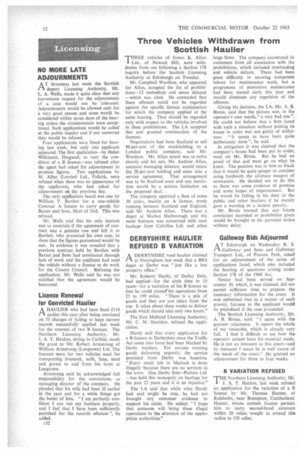Three Vehicles Withdrawn from Scottish Haulier
Page 34

If you've noticed an error in this article please click here to report it so we can fix it.
THREE vehicles of James K. Allan Ltd., of Newark Hill, were withdrawn from use following a Section 178 inquiry before the Scottish Licensing Authority at Edinburgh on Tuesday.
Mr. Campbell Wardlaw, who appeared for Allan, accepted the list of prohibitions-12 immediate and seven delayed —which was cited. He contended that these offences could not be regarded against the specific licence continuation for which the company applied at the same hearing. They should be regarded only with respect to the vehicles involved in these prohibitions. The LA accepted this and granted continuation of the licences.
Negotiations had been finalized to sell 80 per cent of the stockholding to a London public company, said Mr. Wardlaw. Mr. Allan senior was to retire shortly and his son, Mr. Andrew Allan, assistant managing director, would retain the 20 per cent holding and enter into a service agreement. That arrangement was to be finalized soon and any restriction would be a serious limitation on the proposed deal.
The company operated a fleet of some 30 artics, mainly on A licence, trunk running between Scotland and England, said Mr. Andrew Allan. There was a depot at Market Harborough and the main business was concerned with steel haulage from Colvilles Ltd. and other
large firms. The company exonerated its customers from all association with the prohibitions, which included overloading and vehicle defects. There had been great difficulty in securing competent labour for maintenance work, but a programme of preventive maintenance had been started early this year and should eliminate any repetition of the offences.
Giving his decision, the LA, Mr. A. B. Birnie, said that the picture was, in the operator' e own words," a very bad one He could not believe that a firm faced with such a situation without putting its house in order was not guilty of wilfulness. "it seems to have been quite deliberately done ", he said.
In mitigation it was claimed that the company's house had been put in order, went on Mr. Birnie. But he had no proof of that and must go on what he knew. The position was to him so black that it would be quite proper to consider using forthwith the ultimate weapon of revocation. He decided not to do this as there was some evidence of promise and some hopes of improvement. But he would be failing in his duty to the public and other hauliers if he merely gave a warning or a lenient penalty.
Mr. Birnie warned that any future conviction recorded or prohibition given would be brought to his personal notice without delay.
















































































































